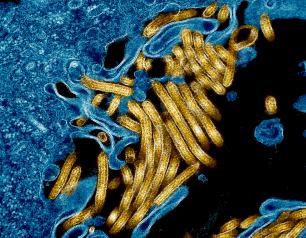3 Results
Experimental Ebola Vaccines Found Safe and Capable of Producing Immune Responses in Healthy Adults
Ebola viruses cause devastating disease in people, resulting in severe and often fatal hemorrhagic fever called Ebola virus disease. Of the four species of Ebola viruses that cause disease in people, Zaire ebolavirus (EBOV) and Sudan ebolavirus (SUDV) have caused more than 30 known outbreaks in the last century, killing more than half of those with the disease. Scientists at NIAID’s Vaccine Research Center (VRC) developed novel vaccines to combat these viruses, which were advanced to clinical trials in response to the 2014-2016 Ebola epidemic in the West African countries of Guinea, Liberia, and Sierra Leone. In two phase 1/1b trials conducted in the United States and Uganda, the researchers evaluated combinations of the experimental vaccines against Ebola disease in healthy adults, finding them safe, tolerable, and capable of producing immune responses. Comparisons between the different vaccine regimens revealed important data on how the vaccines could be administered in routine and outbreak settings. The results of the trials were published last week in npj Vaccines.

Scientists Discuss Prototype Pathogens for Pandemic Preparedness
A special Oct. 19 supplement to the Journal of Infectious Diseases contains nine articles intended as a summary of a National Institute of Allergy and Infectious Diseases (NIAID)-hosted pandemic preparedness workshop that featured scientific experts on viral families of pandemic concern.

Study Finds That People Who Recover From Ebola Virus Infection Can Have Healthy Pregnancies and Children
The Ebola outbreaks in 2014 and 2016 resulted in high mortality; however, many people who were infected recovered. Studies have demonstrated that after recovery Ebola virus can persist throughout the body in the eyes, brain, semen, human milk, and vaginal secretions.

